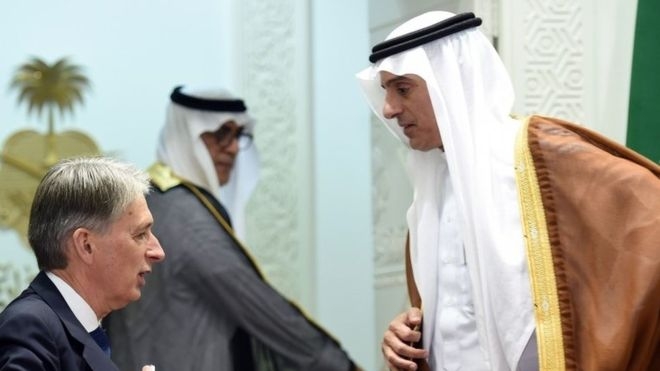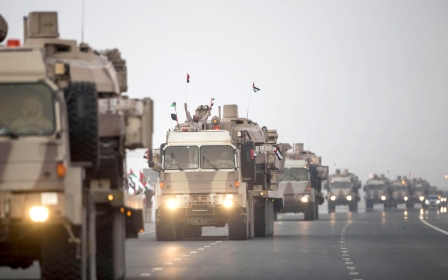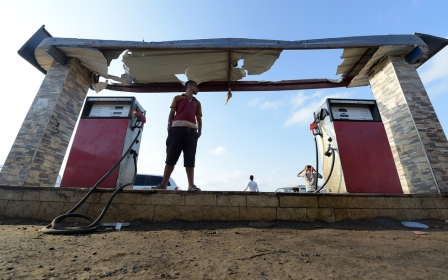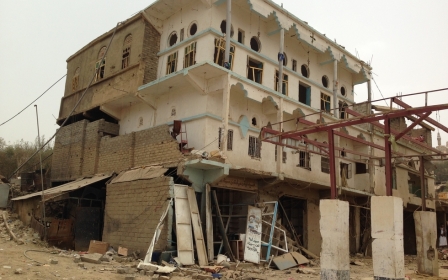UK could freeze arms sales to Saudi Arabia over Yemen strikes

The UK will stop selling weapons to Saudi Arabia if it is found to have breached international law during the months-long conflict in Yemen, the foreign secretary has said.
Philip Hammond, speaking to the BBC’s Newsnight programme on Tuesday night, called for “proper investigations” into Saudi Arabia’s actions in Yemen, where human rights groups warn of large-scale violations by both sides.
However, campaigners say British arms have played a "central" role in the conflict so far, and must be halted immediately while an investigation takes place.
Since March, Saudi Arabia has led a coalition of regional powers in a campaign of air strikes that have targeted Houthis but have also devastated much of the country’s infrastructure.
Several mass casualty attacks attributed to the Saudi-led campaign have mistakenly hit civilian targets, leaving scores of people dead.
The first apparently mistaken attack, which occurred just five days after air strikes began, killed 45 people at a camp for internally displaced people near the Saudi-Yemen border.
In September, an air strike on a wedding in the coastal town of Mokha killed 130 people in the single biggest attack during seven months of war.
A second strike at a triple wedding party a week later killed at least 30 people, including two of the grooms and one of the brides, prompting the UN’s aid chief to demand an “impartial and transparent investigation”.
“With modern weapons technology, there is little excuse for error,” the UN under-secretary-general Stephen O’Brien said after the attack.
However, Saudi Arabia and its allies have always denied that they are behind the attacks, often saying that they have not been conducting operations in the area.
After an air strike attributed to the coalition destroyed a Doctors Without Borders hospital in northern Yemen in late October, Saudi Arabia said the facility “could not have been targeted by the coalition forces”.
A spokesperson expressed “deep regret” that the UN condemned the coalition “without waiting for full and accurate information”.
The Houthis, who are fighting supporters of the Saudi-backed government, are also accused of targeting non-combatants in a war that has so far left at least 4,500 civilians killed or injured.
Their guerrilla warfare tactics have included indiscriminate shelling of residential areas and blockading whole towns like Taiz, which has now been besieged by the fighters for several months.
Stalled investigation efforts
Despite the UN calling for a probe after accusations of violations by both sides, efforts to establish an independent investigation by the UN Human Rights Council stalled last month, reportedly under intense pressure from Saudi Arabia, which is currently chairing the council.
Hammond said on Tuesday that, if it is established that Saudi Arabia has violated international law, the UK will halt arms transfers to the kingdom, which is known to have used British weapons in Yemen.
“The Saudis deny that there have been any breaches of international law. Obviously that denial alone is not enough. We need to see proper investigations,” he said, stating that he plans to “work with” Saudi Arabia to ensure that they are complying with international law.
“We have an export licensing system that responds if we find that it is not,” Hammond said. “We will then find that we cannot licence additional shipments of weapons.”
But, said Hammond, “it would be hypocritical to think that we could have a large defence industry exporting weapons systems and that they never get used”.
Anti-arms sales campaigners, though, say that weapons shipments to Saudi Arabia must be halted immediately, given what Amnesty International has called "damning evidence" of war crimes by the Saudi-led coalition in Yemen.
"There is a humanitarian catastrophe being unleashed on the people of Yemen, and UK arms have been central to it," Andrew Smith of the UK-based Campaign Against Arms Trade told Middle East Eye.
"At the moment the UK government is being represented at the Dubai Air Show, where it is lobbying Saudi Arabia to buy more of its fighter jets. Only two weeks ago Philip Hammond was in Saudi Arabia trying to do the same.
"This is a case of the government saying one thing and doing another."
In a statement to MEE, the government department responsible for approving arms export licences said it operated "one of the most robust arms export controls regimes in the world.
"We never export equipment where there is a clear risk that it might be used for internal repression, or would provoke or prolong conflict within a country, or would be used aggressively against another country.
"We are able to review licences and suspend or revoke as necessary when circumstances require."
In August 2013 the UK temporarily suspended dozens of arms exports licences to Egypt when the Foreign Office, which investigates the human rights situation in countries receiving UK arms, raised concerns.
The contracts were unfrozen a few months later.
On Tuesday the Foreign Office said it was "aware" of allegations of breaches of international humanitarian law by all sides in the Yemen conflict.
"We have raised our concerns with the Saudi government and have received repeated assurances of [compliance with] international humanitarian law."
Saudi Arabia last year became the world’s biggest arms importer, spending an estimated 35 percent of its 2014 budget on weaponry.
Though the US supplies much of Saudi Arabia’s imports, last year netting over $4.6bn from the trade, the UK sold the kingdom around $3bn worth of military equipment.
Though many Western powers have been urged to halt arms sales to Saudi Arabia over alleged human rights abuses, most have declined.
In March, Sweden cancelled a lucrative arms deal with Saudi Arabia, citing abuses of women’s and human rights in the kingdom.
The decision led to a major diplomatic row between the countries, with Saudi Arabia breaking off diplomatic relations and stopping the Swedish Foreign Minister Margot Wallstrom – who on coming to office last year pledged to pursue a “feminist foreign policy” – from speaking about human rights at the Arab League.
New MEE newsletter: Jerusalem Dispatch
Sign up to get the latest insights and analysis on Israel-Palestine, alongside Turkey Unpacked and other MEE newsletters
Middle East Eye delivers independent and unrivalled coverage and analysis of the Middle East, North Africa and beyond. To learn more about republishing this content and the associated fees, please fill out this form. More about MEE can be found here.




